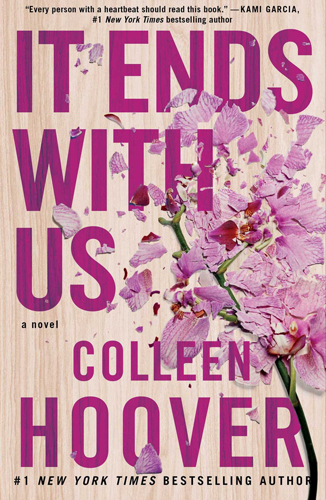When assigned the task of creating a book review for Colleen Hoover’s bestseller It Ends With Us, I was apprehensive.
I had seen its popularity (and controversy) erupt through BookTok and Instagram and, as someone who tends to avoid trending romance novels, I feared a challenge was imminent.
With It Ends With Us being adapted into a film this year, it only seemed right to decipher my opinion on both the book and its film adaptation.
Let’s start with the book:
We’re greeted by a 23-year-old Lily Blossom Bloom (yep) who moves to Boston to follow her dream of opening a flower shop. Lily recalls her past: the abusive household she grew up in and her first love, Atlas, a homeless boy who experienced similar trauma to Lily.
In Boston, Lily meets an arrogant and charismatic neurosurgeon named Ryle Kincaid. They quickly fall in love but the cracks soon show as Ryle becomes more controlling and violent.
Lily has to simultaneously process the abuse of her past whilst battling the one in her present.
Due to the social media hype and cliche conventions of the romance genre, silly me was expecting a breezily written, cringe and banal romance novel with scandalous smut scenes that made you embarrassed about reading on public transport – I was right about the latter…
However, despite sleazy pickup lines and Lily’s internal dialogue that made me wince, I did enjoy the book. Hoover kept me engaged with the unexpected plot developments and deeper-running themes, such as domestic violence, that enhanced the book’s moral mission.
For example, I thought Hoover captured the emotional complexities that come hand-in-hand with domestic abuse and the subjective, yet relatable effect of generational trauma on individuals.
Despite that, because Hoover incorporates the romance genre with themes of abuse, this amalgamation curated controversy from both readers and critics.
Personally, for me, the line between abuse and romance was blurred as when the “charismatic and bold” Ryle Kincaid begged for sex numerous times despite Lily’s clear declination, it seemed as though she found it “sexy” and something that added to his “charm”.
Was this intentional? Was Lily just in denial?
Or did Hoover simply find Ryle’s insistence appealing? I did not and so did others…
For example, Jennie Young from DomesticShelters.org commented on the misrepresentation of abuse in It Ends With Us:
“Ryle is portrayed as a man who desperately wants to be good but is tormented by inner demons. This is, of course, a tired cliché that’s too often applied to abusive men.”
When Ryle attempts to rape Lily and she blames it on his trauma, Young comments that it’s not a heat-of-the-moment situation that it’s made out to be. Instead, it is an evil, premeditated attack that a psychopathic individual would do. This seems to acquit abusers and distort the behaviours we should forgive in the case of abuse.
The fact that Ryle was not put in prison and was allowed to see his daughter was inconceivable to me.
I felt that Hoover created an idealistic and forgiving portrayal of abuse and abusers. The narrative tends to soften the consequences and complexity of abuse, ultimately presenting a more sanitised version of the experience.
Now for the film:
I must admit, I was apprehensive to watch the film, however, Justin Baldoni, the director and lead of It Ends With Us, did a notable job at adapting the novel to the big screen.
The stale elements from the novel, like the Ellen DeGeneres trope and the overly-repeated cliche “naked truth” line, were excluded from the film. Instead, Lily was much more fleshed out, authentic and conceivable than the Lily in the book.
Also, the film captured the denial that coincides with domestic abuse more creatively than in the novel. At first, Ryle’s abusive behaviour was portrayed as accidental, though later on, flashes of Ryle’s violence appeared, conveying Lily’s refusal to face Ryle’s abuse, thereby displaying the complexity abuse has on its victims.
Final Thoughts
The recommended reader for Colleen Hoover’s It Ends With Us is someone who has a liking for raunchy, dramatic and dark romance novels.
If you’re someone who looks for deeper characterisations and challenging notions this may be one to leave out of your collection.
I’ve given It Ends With Us a three-star rating as, although Hoover touches on heart-rending topics and curates absorbing plotlines, I found it to be too simplistic, cliche and lacking in depth.
Despite this, I enjoyed the book’s 2024 film adaptation as it made the narrative less cliche, more creative and ambiguous.
Needless to say, Colleen Hoover books probably won’t be my first pick at the bookshop…
Have you read this book?
We would love to hear your thoughts on this book, perhaps you agree with our review, or, disagree?





